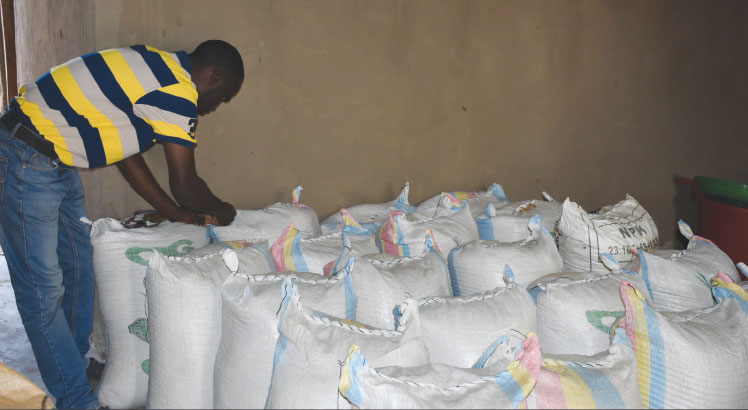Food security, improved livelihoods with manure
Being a predominantly rain shadow area, Amini Village in Traditional Authority Mbera in Balaka District has proved tough for Idana Mawecha to grow maize, the staple food crop.
The 35-year-old man says he could not reap enough from his sweat.
He recalls: “Erratic rains and prolonged dry spells have been frustrating all necessary farm work I could do, including applying fertilisers, to help the crop thrive.”
Mawecha says his household of six used to experience perennial hunger.
“Yields dwindled to 15 bags that could not get us to the next harvesting season,” says the man whose maize crop once wilted due to prolonged dry spells.

The father of four says the drop in harvest worsened with extensive environmental degradation.
Food and Agriculture Organisation (FAO) reports that environmental degradation has accelerated Malawi’s vulnerability to floods, drought and prolonged dry spells fuelled by climate change.
These shocks choke food production efforts of 80 percent of Malawi’s population, who are subsistence farmers, heavily dependent on rain-fed agriculture.
The UN agency further indicates that loss of top fertile soils and rapid deforestation impede stable and sustainable agriculture in Malawi.
Another farmer, Ethel Victor, says they mindlessly cleared forests in a quest to create better crop fields.
“This [the clearance of forests] just ruined the environment and enhanced our vulnerability to unpredictable weather patterns that foiled crop growing efforts,” says the 37-year-old woman.
For years, Victor’s household suffered hunger as their three and a quarter acres of maize gave them only six bags.
However, since 2017, the two farming households and others in the area have been having a peace of mind on food.
Victor’s farm produce increased from six to 35 bags.
“Hunger is history,” says the mother of three.
Mawecha too is all smiles as his two- acre maize field gives him 170 bags.
The farmers attribute their food security feat to the use of Mbeya Manure in their maize fields.
Through the Integrated Resilience Programme, World Food Programme (WFP), in partnership with Find Your Feet, engaged the farmers in manure making by multiplying fertilisers.
Maulidi Yusuf, a farmer in Saiwala Village, says the manure has improved their farming.
“We are assured of bumper yields at low cost. With 10 kilogrammes [kg] of fertiliser, we make 50 kg of Mbeya enough for a half acre plot,” he says.
The farmers make 50 kg Mbeya bag, which is ready for use within 21 days, by mixing 10 kg of animal dung, 10 kg of fertiliser (NPK or Urea), 20 kg of ash and 10 kg of maize bran.
Yusuf states that the manure has improved maize resilience to the harsh weather conditions in their area.
He explains: “Our maize produces big cobs, and survives prolonged dry spells and low rainfall as the manure has enhanced soil texture, fertility and retention of moisture.”
Besides manure, the farmers include climate smart agriculture methods that also support the flourishing of their maize in the semi-arid area.
The development challenged them to embrace crop diversification. The farmers have potato and cassava in their food baskets for food security. They also grow tomato and leafy vegetables for income.
Mawecha says he is economically empowered with proceeds from tomato.
“I make millions of kwacha from selling tomato that I have built a five-bedroomed house roofed with corrugated iron sheets. I bought a motorcycle and livestock and give my family basic needs,” he brags.
To strengthen their resilience to climate change, the USaid- funded programme also engaged the communities in watershed management activities that reduced loss of soil caused by runoffs, and improved soil retention of rainwater.
They built water harvesting structures such as check dams, swales, deep trenches and stone bunds on slopes; and planted trees on bare land to eliminate climate-related devastation.
Agriculture extension development officer for Ntalikachawo Section in Bazale extension planning area, Taulo Osman, is excited that farmers are spending less, but producing more yields.
“Use of manure is sustainable way to replenish fertility in soils. The programme complements our efforts to reach more farmers with initiatives to reap more from their sweat,” he says.
Find Your Feet project officer Leonard Mtalama says they are committed to help farmers in Balaka to build resilience.
WFP Blantyre sub-office head Elton Mgalamadzi says they design the intervention to graduate food and nutrition insecure farming communities from subsistence to surplus-producing households.
He says: “We are delighted the communities have intensified and diversified agricultural production and improve nutrition sustainably.”





